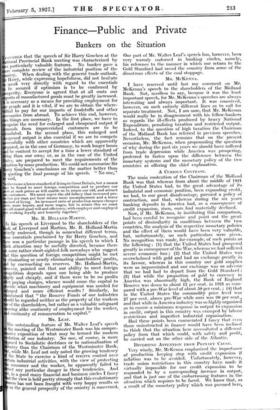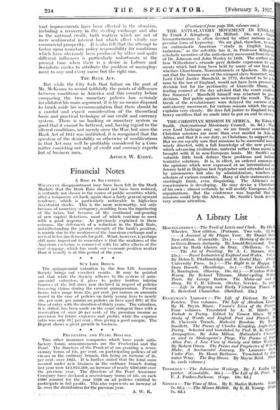Finance—Public and Private
Bankers on the Situation cONSIDER that the speech of Sir Harry Goschen at the National Provincial Bank meeting was characterized by two particularly valuable features. No banker gave a ore complete review of the industrial position of the ebuntry. When dealing with the general trade outlook', gr Harry, while expressing hopefulness, did not hesitate speak very directly with regard to the essentials tfj be secured if optimism is to be confirmed by *osperity. Everyone is agreed that at all costs our ports of manufactured goods must be greatly increased. is necessary as a means for providing employment for r people and it is vital, if we are to obtain the where- thal to pay for our imports of foodstuffs and other Dteessaries from abroad. To achieve this end, however, tic° things are necessary. In the first place, we have to .ognize the need for enlarged and cheapened output if mands from impoverished customers are to be oulated. In the second place, this enlarged and capened output is also essential if we are to compete cessfully with other countries which are apparently Reed, as in the case of Germany, to work longer hours d be content to accept for a time a lower standard of lug than our own; or, as in the case of the United tes, are prepared to meet the requirements of the lation by mass production. We could not summarize Sir rev Goschen's conclusions on the matter better than quoting the final passage of his speech. "No one," said, ishoo to see a lower standard of living in Great Britain, but a means t be found to meet foreign competition and to produce our ds at such prices as will enable us to retain our old, and attract -,customers. We must reject the old fallacy that increased pro- tion per man per hour means more unemployment and a lower idard of living. An increased ratio of production means cheaper Is, more buyers, and more wages, but to attain this we must all-round good will and efficiency, with employer and employed li working loyally and honestly together."
MR. R. HOLLAND-MARTIN.
n his speech at Liverpool to the shareholders of the nk of Liverpool and Martins, Mr. R. Holland-Martin irely endorsed, though in somewhat 'different terms, Sc essentials proclaimed by Sir Harry Goschen, and re was a particular passage in his speech to which I nk attention may be usefully directed, because there some rather short-sighted folk nowadays who suggest at this question of foreign competition might be met y eliminating or nearly eliminating shareholders' profits, and by encroaching on reserves. Mr. Holland-Martin, however, pointed out that our ability to meet foreign competition depends upon our being able to produce gely and cheaply, and if there were to be no profits r paying charges, whence would come the capital to -ide what machinery and equipment was needed for arged and more efficient results ? Similarly, he ntained that "the Reserve Funds of our industries uld be regarded neither as the property of the workers r of the shareholders, but rather as a valuable safeguard uring alike continuity of employment for the worker, d continuity of remuneration to capital."
MR. LEAF.
he outstanding feature. Of Mr. Walter Leaf's speech the meeting of the Westminster Bank was his comprc- sive exposition of what may be termed the modern ution of our industry: No one, of course, is more sed to Socialistic doctrines or to nationalization of ustry than the Chairman of the Westminster Bank, I, while Mr. Leaf not only noted the growing tendency the State to exercise a kind of reserve control over in industrial activities, with the view of protecting consumer and the worker, he apparently failed to eet any particular danger in these tendencies. And , in a good Many financial and businesicireles1 fancy t the view is held pretty stiongly that this evolutionary S has not been fraught with very happy results so the general prosperity a the country is concerned., as One part of Mr. Walter Leaf's speech has, however, been very warmly endorsed in banking circles,. namely, his reference to the manner in which our return to the Gold Standard had saved the country from some of the disastrous effects of the coal stoppage.
• MR. MCKENNA.
I have reserved until last my comment on Mt. McKenna's speech to the shareholders of the Midland Bank. Not, needless to say, because it was the least important speech, for Mr. McKenna's speeches are always interesting and always important. It was conceived, however, on such entirely different lines as to call for separate treatment. Not, I am sure, that Mr. McKenna would really be in disagreement with his fellow-bankers as regards the ill-effects produced by heavy National Expenditure, penalizing taxation and restricted output. Indeed, to the question of high taxation the Chairman of the Midland Bank has referred in previous speeches. Nevertheless, the fact remains that on the present occasion, Mr. McKenna, when propounding the question of why during the past six years we should have suffered from trade depression while America was prospering, preferred to fasten upon the difference between the monetary systems and the monetary policy of the two countries as offering the chief explanation.
A CURIOUS CONTRAST.
The main contention of the Chairman of the Midland Bank was that whereas from about the middle of 1921 the United States had, to the great advantage of its industrial and economic position, been expanding credit, we had, to our great disadvantage, pursued a policy of contraction, and that, whereas during the six years banking deposits in America had, as a consequence of credit expansion, risen, ours had materially declined. Now, if Mr. McKenna, in instituting this comparison, had been careful to recognize and point out the great points of dissimilarity in conditions between the two countries, the analysis of the respective monetary policies and the effect of them would have been very valuable, but, unfortunately, no such particulars were given. No recognition was made, for example, of such points as the following : (1) that the United States had prospered greatly in consequence of the War, whereas we bad suffered severe economic loss ; (2) that the United States was overwhelmed with gold and had an exchange greatly in its favour, whereas in this country our gold supplies were so impoverished and our exchange was so adverse that we had had to depart from the Gold Standard ; (3) that while the proportion of gold to currency in America was abnormally high, the Bank of England Reserve was down to about 12 per cent. in 1921 as com- pared with a pre-War level of about 50 per cent. • (4) that in the United States the commodity price level was 27 per cent. above pre-War while ours was 90 per cent., and that while in America industry was so highly organized as to ensure a minimum response in output to expansion in credit, output in this country was cramped by labour restrictions and imperfect industrial organization.
Had these points been enumerated I fancy that even those uninstructed in finance would have been inclined to think that the situation here necessitated a different policy from that which could, with safety and profit, be carried out on the other side of the Atlantic.
DIVERTING ATTENTION FROM PRIMARY CAUSE.
'Very wisely, Mr. McKenna emphasized the importance of production keeping step with credit expansion if inflation was to be avoided. Unfortunately, however, trade union restrictions in this country have made it virtually impossible for our credit expansion to be responded to by a corresponding increase in output, and that is just one of the embarrassing features in the situation which requires to be faced. We know that, as a result of the monetary 'policy which was pursued here, vast improvements have been effected in the situation, including a recovery in the sterling exchange and also in the national credit, both matters :which are not of mere sentimental interest but which affect vitally our commercial prosperity. It is also felt that the attempt to fasten upon monetary policy responsibility for conditions which have obviously been produced by other and quite different influences is particularly unfortunate at the present time when there is a desire in Labour and Socialistic circles to attribute the problem of unemploy- ment to any and every cause but the right one.
THE BANK Arr.
But while the City feels that failure on the part of Mr. McKenna to record faithfully the points of difference between conditions in America and this country before comparing the two monetary policies has seriously invalidated his main argument, it is by no means disposed to brush aside his recommendation that there should be a careful and expert consideration of the theoretical basis and practical technique of our credit and currency system. There is no banking or monetary system so good that it cannot be bettered, and, having regard to the altered conditions, not merely since the War, but since the Bank Act of 1844 was instituted, it is recognized that the question of the desirability or otherwise of modifications in that Act may well be profitably considered by a Com- mittee consisting not only of credit and currency experts but of business men.
ARTHUR W. KIDDY.



























































 Previous page
Previous page